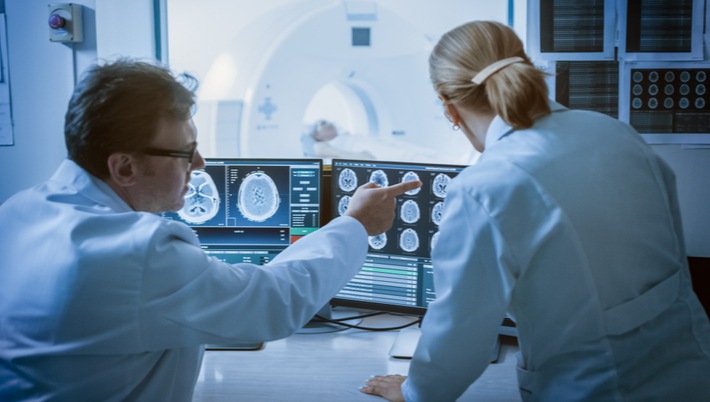We're used to the idea of technology being the driving force behind many of our daily functions. From the hi-tech programming of our Vegas casino online games and online casinos to facial recognition now being used at many airports. Today, we're going to take a look at how this tech is being used to improve our healthcare systems.
In a study carried out in partnership with the UK’s National Health Service, researchers outlined the opportunities that healthcare professionals can explore in using immersive technologies - just like those we're used to develope our Vegas casino online games.
These technologies, called “XR” or “Extended Reality”, cover technologies including Mixed Reality (MR), Virtual Reality (VR) and Augmented Reality (AR). They involve interfaces, software, platforms and haptics and point to how a technology-enabled healthcare system could function more efficiently and more effectively to the benefit of the patient, the healthcare professional and the financial well-being of the whole system.
Study
Ben Williams of Care City London tweeted that the BBC had closed down their VR labs, noting that the knowledge should be shared with the NHS. NHS worker Ross O’Brian, Associate Director Innovation and Technology at the London NHS Foundation Trust and co-Founder of the XR Health Alliance, picked up the idea and together with Dr. Becky Inkster of the Wolfson College at the University of Cambridge and a staff of researchers, began to explore the opportunities and challenges for the creation and distribution of immersive tech in health with the goal of driving additional value for money spend in the NHS.
The result, Early Warning Signs of a Mental Health Tsunami: A Coordinated Response to Gather Initial Data Insights From Multiple Digital Service Providers was released in February 2021. The report examines XR in health care across multiple key application areas including physiotherapy, rehabilitation, healthcare professional clinical skills training, mental health and well-being, patient education and training.
Of particular note was OxfordVR’s interventions which create controlled and safe environments where people with psychoses can learn strategies for overcoming their anxieties while guided by a virtual coach. The use of VR in home care was also examined, specifically how VR can help alleviate cognitive decline that often comes with loneliness.
The study also covered a 2020 paper that showed that bringing VR to palliative care settings has been shown to have positive results and how VR can be used as a tool for reminisce therapy in which memory recall provides entertaining and relaxing experiences for those who can’t physically leave their homes.
In reviewing the literature the NHS report reviewed a case study that focused on pain management, specifically how VR can help burn patients tolerate pain through painful and repetitive treatments such as dressing changes, wound debridement and other painful medical procedures.
Sarah Ticho, one of the authors of the NHS report, discussed ways that cross-sector collaboration between health and entertainment could be key. “I think there are really interesting opportunities to collaborate with the entertainment and games sector using existing entertainment-based experiences”, said Ticho, “ to help create new experiences, that could be used as tools for preventative care.”
Immersive Technology
Immersive technology involves integrating virtual content with the physical environment. The goal of immersive technology is to allow for the natural engagement with the blended reality. Immersive technology dates back to the 1960s when an immersive augmented reality system was created to be used by the US Air Force.
Through immersive technologies it’s possible to create distinct experiences as the physical world merges with the simulated, digital reality using augmented reality (AR) or virtual reality (VR).
Augmented reality creates an immersive experience where a digital device (camera, smartphone, etc) allows users to hear and interact with virtual assets.
Virtual reality involves the computer-generated simulation of an image or environment that a person using special electronic equipment (helmet with a screen inside, gloves fitted with sensors) can interact.
Until recently, these kind of XR technologies were used mostly in video and online casino games. But the NHS study wants to expand what the gaming world has learned about such immersive technologies to harness XR use for healthcare.
Financial Benefits
The authors of the NHS report placed a great deal of focus on the potential savings that would be realized if the health care field adopts some of these technologies and transfers them to preventative and palliative health care. For instance, £2m could be cut out of the £400m annual budget for surgeries if the NHS were to invest in XR. In some cases XR would deliver the same results as would an operation.
The key is collaboration. Industry, health care managers and academic must work together to manifest change. Fiona Kilkelly, the third of the report’s co-authors, pointed out, “The UK has leading edge ideas in healthcare research but it’s a struggle to get access to the technologists to create and make experiences on the back of their research.”
XR Start-Ups in Health Care
There are a number of XR start-ups who are developing AR and VR solutions for immersive technologies in health. Some of them include:
- Fundemental VR – offers flight simulator-like training for surgeons so that they can practice, rehearse and improve their surgical techniques in a controlled environment. Haptic elements provide tactile feedback.
- Karuna Labs – uses evidence-based approaches and virtual reality simulations to treat chronic pain. Patients can be treated at home or in a local doctor’s office or clinic.
- Augmedics – an augmented reality guidance system, called “xvision” for surgery” that enables surgeons to look through the patient’s skin and see the underlying tissue. Increases accurate rate for procedures.
- Surgical Theatre – a surgical rehearsal platform, called Precision VR, that gives surgeons more focused preoperative planning for neurosurgical procedures. Patients can go through the simulations with their surgeon to prepare themselves emotionally and mentally for the upcoming surgery.


